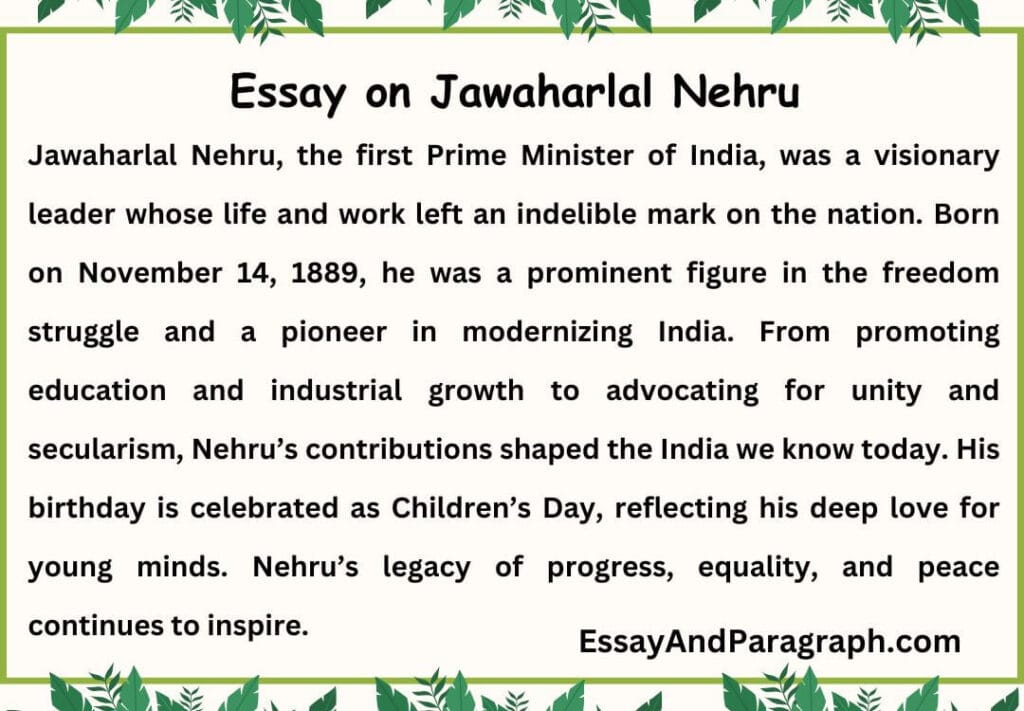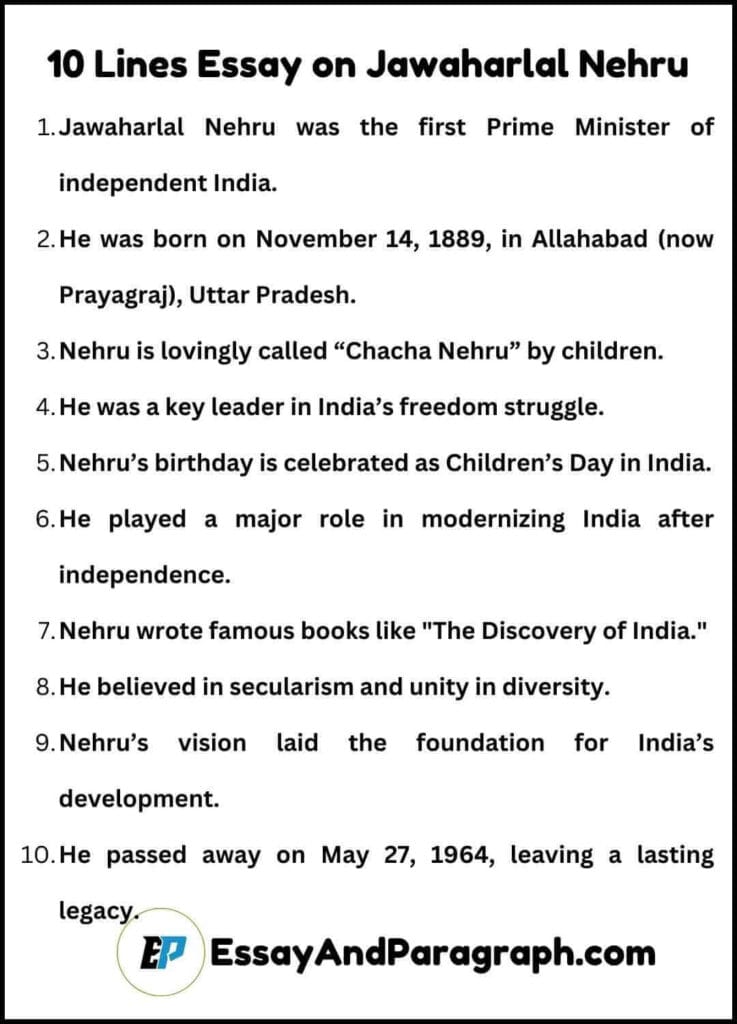Have you ever wondered why Jawaharlal Nehru is often called the “Architect of Modern India”? As India’s first Prime Minister, Nehru played a crucial role in shaping the country’s future after independence. Known for his vision, leadership, and love for children, he remains a beloved figure in Indian history. In this article, we will explore how to write essays on Jawaharlal Nehru, perfect for students.
10 Lines Essay on Jawaharlal Nehru for Students
- Jawaharlal Nehru was the first Prime Minister of independent India.
- He was born on November 14, 1889, in Allahabad (now Prayagraj), Uttar Pradesh.
- Nehru is lovingly called “Chacha Nehru” by children.
- He was a key leader in India’s freedom struggle.
- Nehru’s birthday is celebrated as Children’s Day in India.
- He played a major role in modernizing India after independence.
- Nehru wrote famous books like “The Discovery of India.”
- He believed in secularism and unity in diversity.
- Nehru’s vision laid the foundation for India’s development.
- He passed away on May 27, 1964, leaving a lasting legacy.
10 Lines Essay on Jawaharlal Nehru
Short Essay on Jawaharlal Nehru
Jawaharlal Nehru, born on November 14, 1889, in Allahabad, was a prominent leader in India’s freedom struggle and the first Prime Minister of independent India. Known as “Chacha Nehru,” he had a special bond with children, and his birthday is celebrated as Children’s Day in India. Nehru’s education in England shaped his progressive ideas and vision for a modern, secular India.
Nehru played a vital role in guiding the country after independence. He focused on industrialization, education, and scientific progress to build a strong foundation for India. His love for nature and humanity is evident in his books like “The Discovery of India,” which reflect his deep understanding of India’s culture and heritage. Nehru passed away on May 27, 1964, but his ideals of unity, equality, and progress continue to inspire the nation.
Long Essay on Jawaharlal Nehru
Jawaharlal Nehru, fondly known as “Chacha Nehru,” was one of the most influential leaders in Indian history. Born on November 14, 1889, in Allahabad, Uttar Pradesh, he was the son of Motilal Nehru, a prominent lawyer, and Swarup Rani. Nehru’s privileged upbringing allowed him to receive a world-class education at Harrow and Cambridge in England. His time abroad exposed him to ideas of liberty, equality, and justice, which he later incorporated into his vision for India.
Nehru returned to India in 1912 and soon joined the Indian National Congress. Under the mentorship of Mahatma Gandhi, he became a key figure in the freedom movement. Nehru’s leadership during events like the Non-Cooperation Movement and the Quit India Movement showcased his dedication to India’s independence. His charisma and eloquence made him a beloved leader among the masses.
As the first Prime Minister of independent India, Nehru’s contributions were monumental. He laid the foundation for a democratic and secular India. Nehru prioritized education by establishing institutions like the Indian Institutes of Technology (IITs) and the All India Institute of Medical Sciences (AIIMS). He also promoted industrialization to strengthen India’s economy. Nehru’s foreign policy, based on non-alignment, earned global respect and ensured India’s sovereignty.
Nehru’s love for children and nature earned him the affectionate title of “Chacha Nehru.” His birthday, November 14, is celebrated as Children’s Day, emphasizing his belief in nurturing young minds for a brighter future. Nehru’s vision of unity in diversity and his emphasis on secularism remain guiding principles for India today.
Jawaharlal Nehru passed away on May 27, 1964, but his legacy lives on. He is remembered not only as a freedom fighter but also as a visionary leader who dedicated his life to building a modern and progressive India.
FAQs About Essay on Jawaharlal Nehru
1. Who was Jawaharlal Nehru?
Jawaharlal Nehru was India’s first Prime Minister and a prominent leader in the freedom struggle. Born on November 14, 1889, he played a crucial role in shaping modern India through his progressive policies and vision.
2. Why is Jawaharlal Nehru called “Chacha Nehru”?
Nehru is called “Chacha Nehru” because of his special bond with children. He believed in the importance of nurturing young minds and celebrated their potential. His birthday, November 14, is observed as Children’s Day in India.
3. What were Jawaharlal Nehru’s major contributions to India?
Nehru’s major contributions include promoting education by establishing IITs and AIIMS, encouraging industrialization, and advocating for secularism and democracy. He also introduced the policy of non-alignment in foreign affairs.
4. What is Jawaharlal Nehru’s famous book?
Jawaharlal Nehru wrote “The Discovery of India,” a book that explores India’s rich history, culture, and heritage. It reflects his deep love and understanding of the country.
5. When did Jawaharlal Nehru pass away?
Jawaharlal Nehru passed away on May 27, 1964. Despite his demise, his contributions and ideals continue to inspire generations of Indians.
Top 5 Quotes on Jawaharlal Nehru
- “We live in a wonderful world that is full of beauty, charm, and adventure.”
- “Culture is the widening of the mind and of the spirit.”
- “Failure comes only when we forget our ideals, objectives, and principles.”
- “Democracy is good. I say this because other systems are worse.”
- “The art of a people is a true mirror to their minds.”

Summary on Jawaharlal Nehru
Jawaharlal Nehru, the first Prime Minister of India, was a visionary leader whose life and work left an indelible mark on the nation. Born on November 14, 1889, he was a prominent figure in the freedom struggle and a pioneer in modernizing India. From promoting education and industrial growth to advocating for unity and secularism, Nehru’s contributions shaped the India we know today. His birthday is celebrated as Children’s Day, reflecting his deep love for young minds. Nehru’s legacy of progress, equality, and peace continues to inspire.











